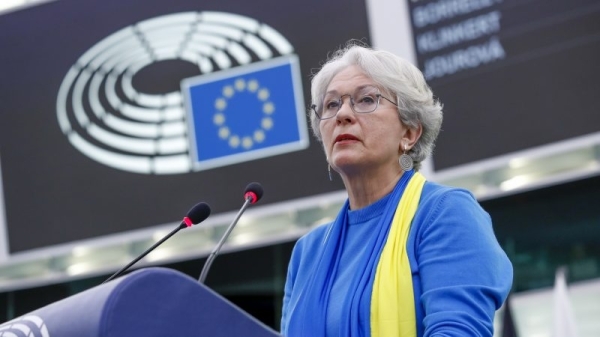MEPs call to step up EU efforts against foreign interference

EU lawmakers on Wednesday (26 April) adopted a resolution calling for coordinated action on foreign interference, warning of risks in the lead-up to next year’s European Parliament elections.
Members of the European Parliament (MEPs), part of the Committee on Foreign Interference (INGE), endorsed with a broad majority a report on the issue of foreign interference and information manipulation, urging a comprehensive and more targeted response to the issue.
The report, led by MEP Sandra Kalniete (EPP, Latvia), notes that Russia’s invasion of Ukraine has highlighted the threat posed by foreign interference to European and global security and stability and cautions that preventative measures should be intensified ahead of EU-wide voting next year.
“Foreign interference in democratic processes represents a growing threat to the security of EU member states and the EU, particularly against the backdrop of rapid technological development and Russia’s ongoing war in Ukraine,” said Kalniete.
“Significant and lasting investments must be made to build our democratic resilience, drawing on the experience of our partners like Ukraine and Taiwan,” she continued.
The report will now be sent to a confirmation vote at the Parliament’s plenary session in May.

EU steps up disinformation fight as threats to staff abroad rise
The EU will launch a new platform to counter disinformation campaigns by Russia and China, the bloc’s chief diplomat Josep Borrell said on Tuesday (7 February), as EU delegations and missions abroad are increasingly becoming a target.
Coordinated action and resilience
The report welcomes last year’s announcement that the Commission will put forward a Defence of Democracy package to strengthen democratic resilience but calls for coordinated EU-wide action to fight information manipulation offensives from hostile powers.
In particular, MEPs want to move away from the current country-agnostic approach towards one which will identify “high-risk third countries” and take into account their potential involvement.
It also calls for establishing an EU structure for analysing data and coordinating research projects on foreign interference and information manipulation and collective efforts at the EU and national level on resilience-building, digital literacy and civic education.
Lawmakers also highlighted the role of the media in building resilience from these hostile initiatives and welcomed Commission initiatives, including the European Media Freedom Act and the proposal to tackle Strategic Lawsuits Against Public Participation (SLAPPs).
Platforms
The report also takes aim at many major online actors that are lagging in countering disinformation on their services and calls on platforms to allocate more resources to monitoring and moderating harmful content.
The report also “deplores recent events at Twitter” that have, since Elon Musk’s takeover, seen a significant reduction in the number of staff responsible for tackling disinformation, and raises the concern that figures spreading this kind of harmful content can obtain verified status through the premium programme Twitter Blue.
The Digital Services Act and Code of Practice on Disinformation are both welcomed in the report, and platforms are called to ensure that they adhere to their commitments, particularly when facilitating access to their data.

EU agrees on anti-coercion instrument to fight foreign interference
In the early hours of Tuesday (28 March), negotiators from the European Parliament and EU member states agreed on a common text for an anti-coercion instrument to help the bloc fight off attempts of economic coercion from third countries.
Critical infrastructure and cybersecurity
The report highlights concerns about the EU’s dependence on foreign actors and technologies in critical infrastructures and supply chains.
The EU lawmakers want greater Commission screening of risks and for the exclusion of the use of equipment from manufacturers in high-risk countries, giving examples such as China’s Huawei and Russia’s Kaspersky.
It also notes concerns about political elites having advanced certain agendas, such as Gazprom in Germany, in the context of the war against Ukraine.
The report calls for increased action on cybersecurity, particularly regarding response preparedness, where it says common regulations, flexibility and information sharing are needed.
Elections and covert influence
The report sets out concerns about foreign influence during the upcoming European elections, set for spring 2024.
It also warns of Russia’s external funding of political parties and politicians and calls for common EU standards for prohibiting foreign funding of political activities.
Beyond the funding of elections, the report also highlights the risks of interference via other means, such as elite capture and research financing.
This point is linked to the European Parliament’s recent scandal, which saw several MEPs and staffers arrested on alleged bribes received from Qatar and Morocco. The report denounces this and calls for accelerated action regarding transparency and combatting such campaigns.
The special committee is set to prepare an additional report looking at the issues in the EU Parliament’s rules on transparency, ethics, integrity and corruption and laying out proposals for reform in these areas, with a vote due in June.
Impacts, neighbourhood and sanctions
The report also notes the heightened impacts of interference on certain groups, particularly refugees and LGBTIQ+ people targeted by Slovakia, Hungary and Poland campaigns.
Attention to interference should also reach beyond the EU, the report argues, to both the immediate neighbourhood and further, with increased cooperation on combatting hybrid attacks abroad.
Regarding responses, MEPs want to increase the costs on perpetrators and proposed the upcoming EU toolbox on foreign interference and information manipulation to include a specific sanctions regime for responding to instances of interference and manipulation.

EU Commission presents toolkit to tackle foreign interference in research
The Commission has released a toolkit aimed at tackling foreign interference in research and innovation (R&I), identified as a growing threat in the increasingly internationalised arenas of education and research.
More on the same topic...




